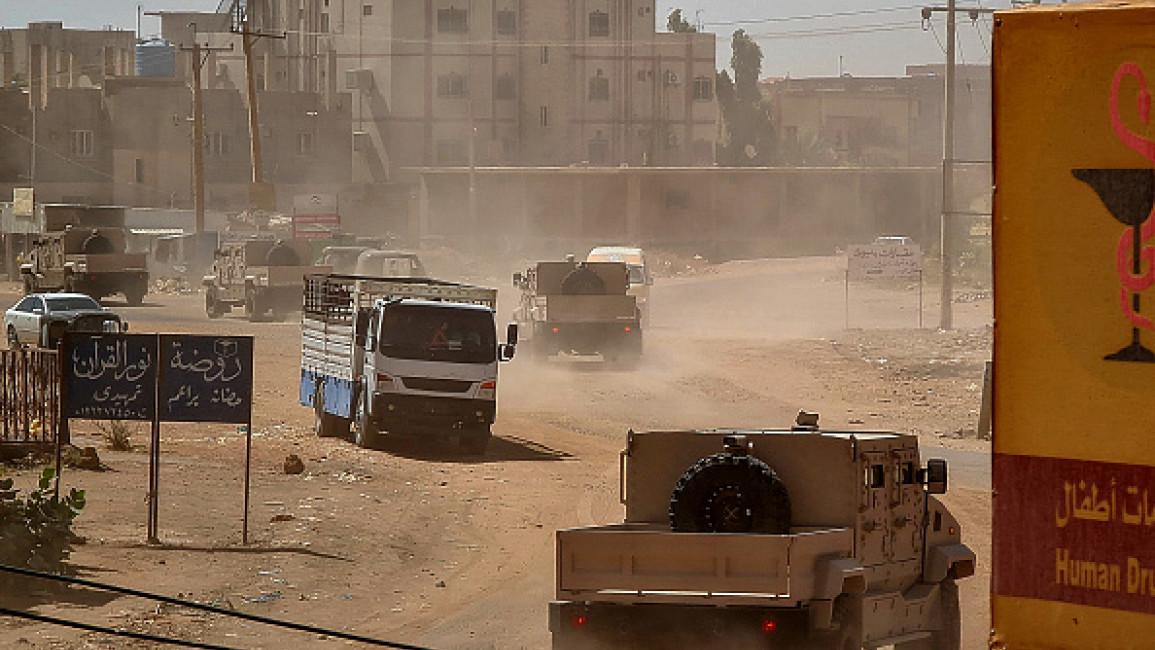Sudan conflict: Khartoum witnesses heavy fighting on eve of Eid al-Adha holiday
Fighting raged in the Sudanese capital on Tuesday, the eve of the Eid al-Adha Muslim holiday, after paramilitaries seized Khartoum's main police base.
Fighting in the city between the army led by General Abdel Fattah al-Burhan and General Mohamed Hamdan Daglo's paramilitary Rapid Support Forces (RSF) is now concentrated around military bases.
At the same time in Sudan's west, the conflict is worsening to "alarming levels" in Darfur, the United Nations warned.
Since the war erupted on April 15, the RSF has established bases in residential neighbourhoods of the capital while the army has struggled to gain a foothold on the ground despite its air superiority.
As the RSF fights to seize all of Khartoum, millions of people are still holed up despite being caught in the crossfire without electricity and water in oppressive heat.
Late Sunday the RSF announced they had seized the headquarters, on Khartoum's southern edge, of the paramilitary Central Reserve police sanctioned last year by Washington for rights abuses.
On Tuesday the RSF attacked army bases in central, northern and southern Khartoum, witnesses said.
Mawaheb Omar, who has been stuck at home with her four children, told AFP that she expected Eid celebrations, normally a major event in Sudan, to be "miserable and tasteless as we can't even buy mutton".
On Saturday the UN urged "immediate action" to stop killings of people fleeing El Geneina, the West Darfur state capital, by Arab militias aided by the paramilitaries.
Washington has blamed the "atrocities" in Darfur primarily on "the RSF and affiliated militia".
The RSF is descended from Janjaweed militia unleashed by Khartoum in response to a 2003 rebel uprising in Darfur, leading to war crimes charges.
In the current fighting the RSF have been accused of looting humanitarian supplies, factories and houses abandoned by those displaced by the fighting or taken by force.
Daglo responded to these accusations on Tuesday in an audio recording posted online.
"The RSF will take swift and strict action" against those in its ranks who have carried out such abuses, he said.
The RSF had announced on Monday evening that it was beginning to try some of its "undisciplined" members, as well as the release of "100 prisoners of war" from the army.
Since the beginning of the conflict, both sides have regularly announced prisoner swaps through the Red Cross, without ever giving the exact number of those captured.
Daglo, a native of Darfur, also spoke of the fate of this gold-rich area where more than one in four Sudanese live.
We must "avoid plunging into civil war", he said.
The UN and African blocs have warned of an "ethnic dimension" to the conflict in Darfur, where on Tuesday Raouf Mazou, the UN refugee agency's assistant high commissioner for operations, told a briefing in Geneva there is a "worsening situation" in West Darfur state.
"According to reports from colleagues on the ground, the conflict has reached alarming levels, making it virtually impossible to deliver life-saving aid to the affected populations," he said.
The army is not only faced with difficulties in Khartoum. New fronts have opened against it from a rebel group in Kordofan state, south of the capital, as well as in Blue Nile state on the border with Ethiopia.
In South Kordofan, authorities have decreed a night-time curfew to curb the violence.
The UN mission in Sudan, which withdrew almost all its staff from the country at the start of the war, expressed "grave concern" about the violence in Kurmuk, near the Ethiopian border.
Fighting there has caused hundreds of civilians to flee to Ethiopia, it said.
Since the conflict flared, around two million people have been displaced within Sudan, while another 600,000 have fled across the borders, mainly to Egypt in the north and Chad in the west.
Aid has reached at least 2.8 million people in Sudan, the UN said, but agencies report major hurdles to their work, from visas for foreign humanitarians to securing safe corridors, and a lack of funds.
A record 25 million people in Sudan need humanitarian aid and protection, the UN says.



![Gaza truckers protest [Mahmoud Abu Salama] Gaza truckers protest [Mahmoud Abu Salama]](/sites/default/files/styles/image_330x185/public/media/images/568A6832-3580-4DF0-BCA8-A1B8104C43D0.jpg?h=d1cb525d&itok=z5Ji0rg4)